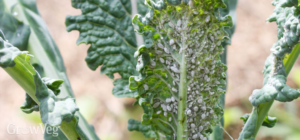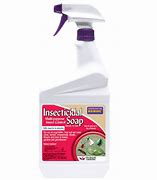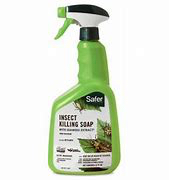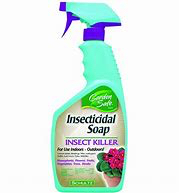If you are looking for a safe, effective, and low toxicity alternative to more toxic pesticides to control many undesirable insects in your garden, insecticidal soaps may fit the bill.
- Insecticidal soaps have many advantages when compared to other insecticides.
- They are inexpensive to use, are among the safest pesticides,

- Leave no harsh residue,
- Are natural products that are virtually non-toxic to animals and birds, and
- Can be used on vegetables up to harvest.
- In addition, most beneficial insects are not harmed by soap sprays.
- They are inexpensive to use, are among the safest pesticides,
- Small, soft-bodied insects such as aphids, mealybugs, thrips, scale crawlers, and spider mites are most susceptible to the soaps.
- It will kill soft-bodied lacebug nymphs (an immature life stage) but it won’t damage their hard eggs.
- Hard-bodied insects, like beetles, won’t be affected by insecticidal soaps.
- Insecticidal soaps kill by suffocation, they appear to disrupt the cellular membranes of the insect, and
- They remove protective waxes that cover the insect, resulting in dehydration.
- Insecticidal soaps are also an effective leaf wash to remove honeydew, sooty mold, and other debris from leaves.
The label on any brand of insecticidal soap will give very specific information at to how it’s best used (after all, they want you to get the best results from their product so you’ll say nice things about it to your friends).
The label on Garden Safe® Brand Crawling Insect Killer reads as follows:
“Do not apply the soap in full sun or at temperatures above 90 oF as this may damage the plants. High temperatures and high humidity may increase plant stress and, therefore, sensitivity. It is best to treat your plants in the early morning or late in the day. Since the soap spray is only effective as long as it is wet, the slower drying conditions favor better insect or mite control. It is important to spray both the top surface and, especially, the underside of the leaves as many of the pests will be found there. Because of the relatively short residual action and the fact that the insects must be in contact with the soap to be effective, repeat applications may be necessary every 4- to 7-days (follow the label directions) until the pests are eliminated. Avoid excessive applications as leaf damage may accumulate with repeated exposure. Always follow the directions on the label.”
Commercial insecticidal soaps are a highly refined version of liquid dish soap. While you could make your insecticidal soap mixture, there is a substantially increased risk of plant injury with them. Dry dish detergent and all clothes-washing detergents are far too harsh to use on plants because of all the additives in them. Some soaps and detergents are poor insecticides, and other additives in these products may be phytotoxic (i.e., they may damage the plant).
Some plants are sensitive to soap sprays and may be seriously injured by them. Read the label to make sure your plant is not one of them.



Insecticidal soap? or Neem oil?
What puts neem oil on a vantage point is it can also control mites and fungal diseases which is not the case for insecticidal soap. It is one of the most effective treatments for powdery mildew.
It prevents and controls the following diseases:
• Leaf spot
• Black spot
• Rust
• Scab
• Anthracnose • Tip blight
It can also control bacterial diseases in plants and should be applied to plants when they are dormant during winter.
Due to the nature of neem oil, your plants are susceptible to burning due to improper application. They should be applied early in the morning or at night.
Insecticidal soap has less risk of burning your plants unless you apply it on plants that are sensitive to it.
Like other insecticides, it may also burn if applied under the afternoon sun. Other than that, insecticidal soap doesn’t pose risks of burning plants unless you forget to dilute it in water.
Overall, the best insecticide depends on your preferences. If you want an insecticide, fungicide, and miticide in one solution, neem oil will be best for you. That is if you are willing to accept the risks associated with using neem oil.
